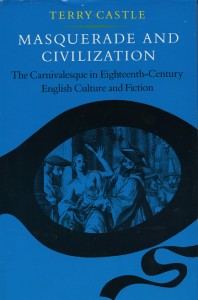
Masquerade & Civilization
The Carnivalesque in Eighteenth-Century English Culture and Fiction(Reviewers’ comments)
“A wealth of historical detail about the masquerade in 18th-century life and literature and a stimulating interpretation of what its prominence in that period reveals about the nature of identity and narrative. . . . An important contribution to literary criticism and to the history of leisure, this book will confirm Castle’s place among the major influences on the most exciting current scholarship in 18th century literature and gender studies.” —Philological Quarterly
“This is an outstanding book, vividly written and deftly organized, with a clear conceptual structure. [...] Most students of the period will have come across some examples of … masquerade mystifications, and perhaps encountered some of the fictional cases which Castle cites. But their symbolic meaning has never been explored with any degree of rigor or historical insight. Castle has managed to give this familiar topic of old-fashioned social history a real ideological place in the Hanoverian scheme of life. This is one of the most important readings of 18th-century mentalité to have appeared in this decade, as well as a most original and gripping survey of a fascinating social phenomenon. I can only urge every student of the period to rush to get hold of a copy.”—Albion
“By far the best treatment of the masquerade–for cultural historians–is that offered by offered by Terry Castle, in Masquerade and Civilization: the Carnivalesque in Eighteenth-Century English Culture and Fiction and The Female Thermometer: Eighteenth-Century Culture and theInvention of the Uncanny. A wonderful historian, as well as an insightful critic, Castle has made arguments so comprehensive and far-reaching that all contemporary commentators on the masquerade must write in her shadow. Challenging the older, traditional view of the eighteenth century as a period dominated by, and celebratory of, the divinity of reason, Castle maps the shadow side of the period, its repressions and madness, its conflicts and desires. Crucial to her understanding of the century as a whole, the masquerade becomes a ‘carnival’ of desire that nicely represents a larger‘culture of travesty.’ I am [. . .] indebted to her work.” –Bradford K. Mudge, The Whore’s Story: Women, Pornography, and the British Novel, 1684-1830.
“Having focused her first book, Clarissa’s Ciphers, entirely on the most important novel of eighteenth-century England, Terry Castle turns in her second to peripheral fictions often declared ‘unreadable’ because of their apparent structural and tonal instabilities. She reads under the sign of masquerade Pamela II, Amelia, Cecilia, and A Simple Story, discovering in each novel new grounds of interest, new principles of action–with results both provocative and illuminating. She also provides a brilliant and economical history of the masquerade as cultural manifestation and psychological fact. [...] She both demands and creates engagement in her readers. And she outlines and substantiates important modes of confronting the eighteenth-century English novel: by taking seriously its inevitable ideological involvements, by paying attention to the meanings of even conventional or confused plots, by wrestling with the connections of literature and culture rather than merely paying lip service to the fact of such connection. She has written a splendid book.”–Eighteenth-Century Studies
